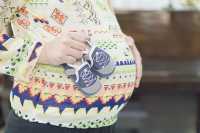
07 Nov More Postnatal Depression with Baby Boys?
MedicalResearch.com Interview with:
 Dr Sarah Myers PhD
Dr Sarah Myers PhD
Honorary Research Associate
UCL Department of Anthropology
MedicalResearch.com: What is the background for this study?
Response: Postnatal or postpartum depression is unfortunately common after giving birth; a figure often quoted is 15%, but some studies have found much higher numbers. Postnatal depression is associated with a range of poorer outcomes for mothers and their infants, and the financial costs of treating maternal mental ill health put health services under considerable strain. Studies have found that providing additional emotional support to at risk mothers, for instance via peer support programmes or regular phone calls with health visitors, can reduce the likelihood of them developing the condition. Therefore, it is really important that we understand the full range of risk factors that put women at greater risk of becoming depressed after giving birth.
There is increasing evidence for a link between inflammation and depression, with factors that trigger an inflammatory immune response also increasing the likelihood of depressive symptoms. The opens up the possibility of finding new risk factors for postnatal depression based on known associations with inflammation.
MedicalResearch.com: What are the main findings?
Response: It has been known for some time that pregnant women carrying a male foetus have higher levels of inflammation than women carrying female foetuses, suggesting giving birth to male infants may be a risk factor for postnatal depression. This predication is supported by our finding that mothers were more likely to have experienced depressive symptoms after they gave birth to sons than daughters.
Experiencing birth complications is also likely to cause inflammation – things like caesareans and episiotomies inflict wounds and increase the risk of infection. Again we found that in our sample of mothers, women were more likely to experience postnatal depression after births that were complicated than after births that were not.
Giving birth to male infants during a complicated delivery particularly elevates depressive risk.
MedicalResearch.com: What should readers take away from your report?
Response: We don’t want to scare mothers who know they are carrying a boy or have just had an emergency c-section – stress has been shown to trigger inflammation too. Health workers already seek to identify women at greater risk of developing postnatal depression, these results just point to two new factors which could be usefully considered when making such judgements.
MedicalResearch.com: What recommendations do you have for future research as a result of this work?
Response: Our research was based on a data that was collected retrospectively from women who had finished having children. We now strongly recommend work to assess whether these results replicate in women who are currently pregnant.
MedicalResearch.com: Is there anything else you would like to add?
Response: We didn’t collect data on actual levels of inflammation, that was just the theoretical starting point for asking the questions we did, so there may be different causal factors – but if women find looking after male infants or caring for infants after difficult births harder, then that is important to know too.
The research was conducted while I was at the University of Kent, in collaboration with Dr Sarah E. Johns at the School of Anthropology and Conservation. I am currently an Honorary Research Associate at University College London’s Department of Anthropology.
Citation:
**Winner of The International Society for Evolution, Medicine, and Public Health’s George C. Williams Prize for best article: Myers, S., Burger, O., and Johns, S.E. (2016). Postnatal depression and reproductive success in modern, low-fertility contexts. Evolution, Medicine, and Public Health 1:71-84
Myers, S. and Johns, S.E. (2019). Male infants and birth complications are associated with increased incidence of postnatal depression. Social Science & Medicine 220: 56-64
Myers, S. and Johns, S.E. (2018). Postnatal depression is associated with detrimental life-long and multi-generational impacts on relationship quality. PeerJ 6:e4305
[wysija_form id=”3″]
[last-modified]
The information on MedicalResearch.com is provided for educational purposes only, and is in no way intended to diagnose, cure, or treat any medical or other condition. Always seek the advice of your physician or other qualified health and ask your doctor any questions you may have regarding a medical condition. In addition to all other limitations and disclaimers in this agreement, service provider and its third party providers disclaim any liability or loss in connection with the content provided on this website.
Last Updated on November 7, 2018 by Marie Benz MD FAAD
